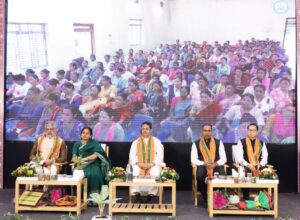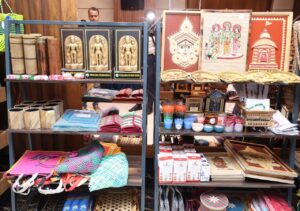Tripura CM Manik Saha announced that 1,08,281 women from Self Help Groups have become ‘Lakhpati Didis,’ achieving 95% of the state’s target. With strong financial support, integrated farming clusters, and diverse enterprises, the government prioritises women’s empowerment and rural self-reliance, aligning with PM Modi’s vision for the Northeast.
Tripura Chief Minister Dr. Manik Saha on Thursday highlighted the state’s remarkable progress in women’s empowerment, announcing that as many as 1,08,281 women from Self Help Groups (SHGs) have emerged as ‘Lakhpati Didis’, achieving 95 percent of the government’s ambitious target.
Speaking at the ‘National Workshop on Integrated Farming Cluster for North Eastern States’ in Agartala, CM Saha said the initiative is transforming rural households and inspiring a new wave of self-reliance among women.
Empowerment Through SHGs
Among the 4.85 lakh women members of SHGs in Tripura, over one lakh have crossed the annual household income threshold of ₹1 lakh, earning the recognition of ‘Lakhpati Didis.’ These women are engaged in diverse entrepreneurial activities such as piggery, goatery, poultry, fishery, catering, agro-ecological practices, and micro, small, and medium enterprises (MSMEs).

“These ‘Lakhpati Didis’ are not only economically empowered but are also leading their families towards prosperity. Their success reflects determination, government support, and the power of community solidarity,” CM Saha said.
He further noted that beyond financial progress, these women are inspiring others by adopting sustainable livelihood practices and achieving improved standards of living.
Financial and Institutional Support
To strengthen SHG initiatives, the state government has extended bank loans worth ₹1,677 crore to women members, while an additional ₹787 crore has been provided as revolving funds and community investment. This financial support has enabled women to scale up their ventures, access markets, and diversify income sources.
Currently, 3.13 lakh women farmers in Tripura are engaged in agriculture and livestock-based livelihood activities, forming a backbone of the state’s rural economy.
Integrated Farming Cluster Approach
Emphasising agriculture’s vital role, CM Saha said, “Agriculture is the backbone of the country’s economy and the lifeline of rural households. To strengthen livelihoods, particularly for SHG Didis, the Integrated Farming Cluster (IFC) approach has been conceptualised, aligning with Prime Minister Narendra Modi’s vision.”

In Tripura, 80 IFCs have already been launched with an investment of ₹32 crore. Each cluster links 250–300 small and marginal farmers to livelihood service centres, which provide access to quality seeds, fertilisers, modern equipment, and improved market connectivity.
This model aims not only to boost farm productivity but also to ensure stability of income, food security, and resilience against climate and market fluctuations.
Northeast as ‘Ashtalakshmi’
CM Saha recalled Prime Minister Modi’s vision of the North-eastern states as the ‘Ashtalakshmi of India’, stressing that strengthening infrastructure, connectivity, and livelihood opportunities in the region remains a central focus of the government.
“The BJP government’s main target is that every family should become self-reliant with special focus on women and youth,” he added.
A Path to Inclusive Growth
The success of Tripura’s women under SHGs is being viewed as a model for rural development and gender empowerment across the North-eastern states. By combining financial support, institutional guidance, and community-driven farming practices, the government aims to expand the reach of such initiatives, making women the key drivers of change in rural households.
| Also Read: Tripura CM Manik Saha: Investing in Children is Investing in India’s Future |
As the state inches closer to achieving its target of 1.14 lakh ‘Lakhpati Didis’, the initiative is expected to further transform livelihoods, strengthen rural economies, and align with India’s broader goal of women-led development.













